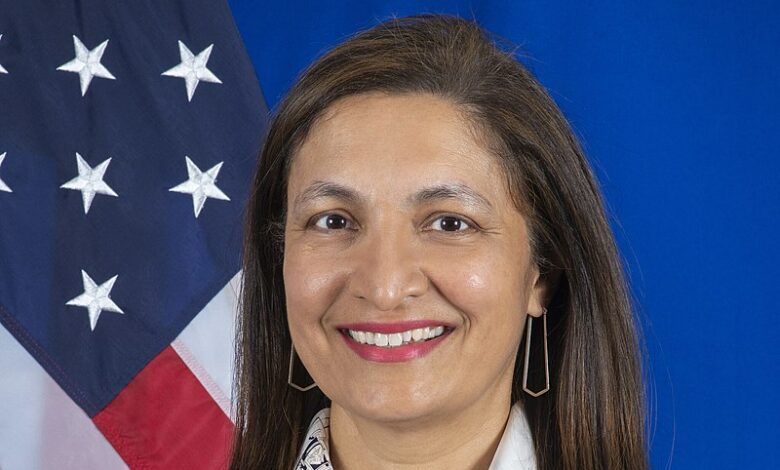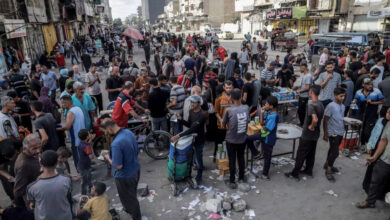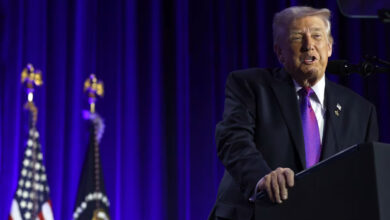
The US Undersecretary of State for Security and Human Rights Uzra Zeya praised Egypt’s vital role in pushing for aid into Gaza in an exclusive interview with Al-Masry Al-Youm, and touched on exactly what America is doing to stop the bloodshed and why it doesn’t support a ceasefire.
■What is the purpose of your visit to Cairo? How do you see Egypt’s position regarding Gaza?
My visit to Egypt comes to hold a series of excellent discussions with key partners in the Ministry of Foreign Affairs, the Egyptian Red Crescent, and partners of United Nations agencies.
Here I confirm that the Egyptian government is playing an exceptional role to ensure that vital humanitarian aid reaches civilians in Gaza, as well as to help foreigners – including Americans – cross safely into Egypt and then exit.
We could not have done so without Egypt’s leadership.
■ You talk about America’s efforts to bring in aid. What are these steps?
We want to expand and accelerate the flow of humanitarian aid to Gaza, and figure out ways to enable all foreigners to safely exit Gaza. We’re also working with Egypt and other international partners to further protect civilians in Gaza, and we’re putting in intensive effort to to reach humanitarian goals.
The past three weeks saw major progress reached, as we went from virtually nothing to over a thousand trucks loaded with life-saving aid.
The exit of foreigners with Cairo’s efforts makes us grateful to the Egyptian government, and we are working to prevent the spread of the conflict and return American hostages alongside other foreign nationals.
■ Is it acceptable for the US to supply Israel with weapons, and in return supply Gaza with aid?
We support Israel’s right of self-defense and view the Hamas movement as one that disregards civilians, both Israeli an Palestinian.
Regarding aid, America is the leading donor country internationally to the people of Palestine, having provided over US$470 million this year to to meet the needs of Palestinians in the West Bank and Gaza Strip.
US President Joe Biden announced an additional amount of $100 million since October 7, and in the coming days we will provide further aid in the form of food.
■ Washington’s support for Tel Aviv continues, and US Secretary of State Anthony Blinken spoke about the “five no’s”. Isn’t his statement contradictory, and how is it humane to kill children, women, and fetuses in wombs?
I confirm that Secretary Blinken said: “No to displacing Palestinians from Gaza now or after the war, no to using Gaza as a platform for (terrorism), no re-occupation, no attempt to besiege Gaza, no reduction of the territory of Gaza.”
The US currently does not support a ceasefire, as it believes it will allow Hamas to continue to threaten Israel.
Hamas has announced its intention to repeat its attacks several times if given the opportunity.
A ceasefire at this stage leaves Hamas in power, putting it in a position to continue to further threaten Israel.
■ How can Washington call for human rights when it does not protect human life in Gaza?
We work with international governmental organizations such as the Egyptian Red Crescent, and international organizations such as the United Nations, UNICEF, and UNRWA, to provide humanitarian relief and we are also working to protect civilians within the Gaza Strip.
■ Russia and China called for a draft ceasefire resolution in the Security Council, but America blocked it. Doesn’t that mean that both Moscow and Beijing support peace and Washington supports the war continuing?
I want to clarify that the draft Security Council resolutions and the UN General Assembly resolutions that were put forward did not include a condemnation of the Hamas movement, even after it killed more than a thousand Israeli people, nor did the draft resolutions acknowledge Israel’s right or duty to defend itself.
The US absolutely opposes any forced displacement or displacement of Palestinians outside Gaza.
We realize the importance of this issue, and the future Palestinian state must revolve around the aspirations of the Palestinian people and not Hamas – which we believe does not represent them.
■ America says that it will not allow Hamas to repeat attacks, as it wants to eliminate the movement. What is the guarantee that Hamas 1 and Hamas 2 will not emerge, what are the US’s scenarios after the war, and why does Washington not let the Palestinian people decide their fate?
As for the presence of Hamas 1 or 2 in the future, I will not go into hypotheticals.
What concerns us is that if the US fails to solve this problem, it will be a major failure for the US and the entire region.
It is very important that Israel prevent Hamas’ ability to repeat what happened on October 7, however we are concerned with the Palestinian issue which is why we focus intensely on confronting the immediate effects of this crisis when the long-term horizon is put on the table.
The Palestinian people must decide their fate, and the two-state solution is the only permanent solution to this crisis.
■ Was America preoccupied with defending Israel in exchange for turning a blind eye to the events in Sudan, Niger, and Ukraine? If the US failed in its plans in Gaza, would this mean losing its influence in the Middle East?
Regarding the possibility of Washington’s failure, we are very committed and loyal.
At the same time there are other crises that we must be able to address. It is true that Washington provides support for a number of countries, as there are multiple simultaneous crises such as in Ukraine, Sudan, or Niger.
I have global powers in my role as US Under Secretary of State to deal with all of these overlapping crises, but we don’t do it alone – it must be part of our multilateral engagement in working with international partners and outside governments as well.




